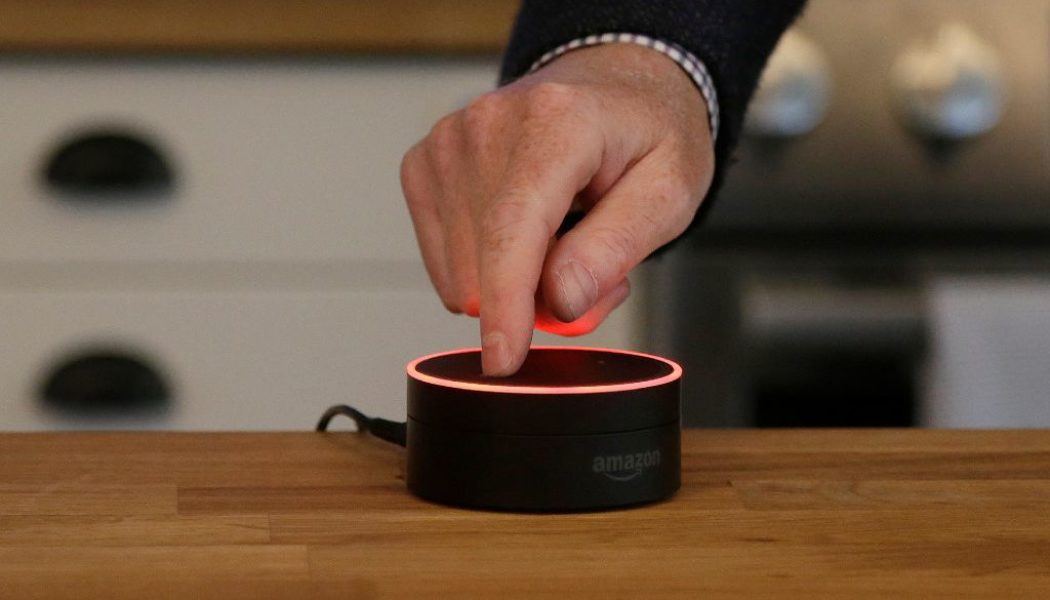/cloudfront-us-east-1.images.arcpublishing.com/dmn/VCQBMCFW5SBXPHQCMWLDZQ4ACU.jpg)
The packaging of the Amazon Echo boasts that Alexa is happy to help. Happy to help us in what way? What is it Alexa can help us achieve?
She can help us become the people we are becoming. For our waking lives more and more resemble a never-ending all-you-can-eat buffet. Consumables include movies, books, music, stuff — with Amazon Prime, Spotify Premium, Netflix and YouTube among others treating us to an unending smorgasbord of consumption. There’s content, lots of it, and free with a paid subscription, making it hard not to binge-watch, which is but the latest form of our binge-buying and binge-consuming.
A few years ago, a piece in Costco’s lifestyle magazine offered up a remedy to daylight saving time’s adverse effects on our moods and health: “New clothes can give a pleasant little shot of happiness in November (in spring, too. Oh, heck, throughout the year).”
Amazon and Costco and Apple and everyone else today don’t just market goods and services; they make promises, half in jest but half in earnest, that somehow they can deliver something else: happiness. “Go Premium. Be happy,” says Spotify. And even though we know it’s at best a joke or at worst a lie, we let ourselves be convinced and then we always end up somewhat short of happiness.
The belief that gratifying wants through consumable goods and services will fulfill us and thereby make us happy is called consumerism. The most obvious problem is that what consumables can deliver are temporary bursts of positive emotions, but a happy life is not marked by episodic highs; consumerism leads us to have a superficial view of happiness. Another is that consumerism isn’t interested in satisfying needs, which are limited, but wants, which are unlimited and therefore incapable of being satisfied. Or better, consumerism converts wants into needs; it turns the latest gadget into a dreadful necessity rather than a delightful luxury. Still another is that today’s emotional highs will automatically become tomorrow’s emotional lows: what’s excitingly cutting edge soon becomes what is frustratingly outdated, and the vicious cycle of emotional highs and lows continues. Finally, the act of consumption is fleeting. But we’re not. We need deeper sources of meaning to sustain our lives, for while creativity fills us up, consuming empties us out.
The real question is why, why do we act as though consumerism’s false promises are true even though we all know they aren’t? And the answer, I think, is that consumerism plays on four human weaknesses.
First, it inflames rather than curbs our natural appetite for luxuries. We are all touched with dragon sickness, coveting precious, rare and sweet things. Second, it exacerbates rather than curbs our natural desire to have more than others. We don’t want to keep up with the Joneses; we want more than everyone else. Third, it leads us to want more now rather than fewer over time, inciting an irrational preference for quantity over quality, present enjoyment over long-term satisfaction. Fourth, it takes advantage of our aversion to effort by making consumption utterly convenient, a mere push of the button (or even the absence of a push of the button, as the next episode automatically begins).
The fact is that we need not surrender to consumerism despite these natural weaknesses. The classical cardinal virtues can be our best defense. First, moderation is that expertise in sorting needs and wants while remaining perspicaciously aware that happiness will not be found by confusing them. Second, justice gives us the perspective to see the absurdity of competition concerning external goods when the really important goods are internal; here the competition is not with others but with ourselves, as we strive to become the best person we can be. Third, prudence counters the illusion that the present enjoyment of many things is superior to the long-term enjoyment of fewer, more enduring things; it savors what’s lasting and fulfilling rather than what’s fleeting and disappointing. Fourth, courage upends the logic of convenience by provoking us to fight for the more arduous but important goods.
While it is true that consumer goods are often innocent enough pleasures, they are not the substance of life. Behold the hearth fire and tasty meals, about which are arranged family and friends; in the festivities of a life lived and celebrated, in the encounter with the sorrows and joys of our companions, in the strain of making and doing, in the talk of the things that really matter, there we will find a life that lives, a life lived through producing and receiving works of love.
Consumerism’s allure should not be underestimated: It will easily crowd out the true sources of human happiness. Moderately, justly, prudently and courageously, let us say: “Go ahead and smile, Alexa, but I won’t on your account.”
Chad Engelland is chair of the Philosophy Department at the University of Dallas. He is the author of several books, including, most recently, Phenomenology (MIT Press, 2020).
Join Our Telegram Group : Salvation & Prosperity






![The New York Times Magazine profiles Catholic podcasting star Father Mike Schmitz [NYTimes paywall]…](https://salvationprosperity.net/wp-content/uploads/2022/08/the-new-york-times-magazine-profiles-catholic-podcasting-star-father-mike-schmitz-nytimes-paywall-327x219.jpg)

